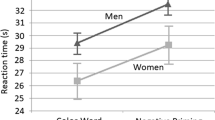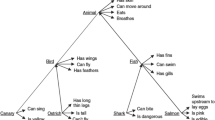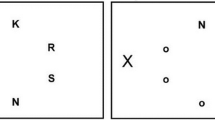Abstract
The present study explores the issue of why ambiguous words are recognized faster than unambiguous ones during word recognition. To this end we contrasted two different hypotheses: the semantic feedback hypothesis (Hino and Lupker in J Exp Psychol Hum Percept Perform 22:1331–1356, 1996. https://doi.org/10.1037/0096-1523.22.6.1331), and the hypothesis proposed by Borowsky and Masson (J Exp Psychol Learn Mem Cognit 22:63–85, 1996. https://doi.org/10.1037/0278-7393.22.1.63). Although both hypotheses agree that ambiguous words benefit during recognition in that they engage more semantic activation, they disagree as to whether or not this greater semantic activation feeds back to the orthographic level, hence speeding up the orthographic coding of ambiguous words. Participants were presented with ambiguous and unambiguous words in two tasks, a lexical decision task (LDT) and a two-alternative forced-choice task (2AFC). We found differences between ambiguous and unambiguous words in both the LDT and the 2AFC tasks. These results suggest that the orthographic coding of ambiguous words is boosted during word processing. This finding lends support to the semantic feedback hypothesis.


Similar content being viewed by others
Notes
Note that the following description and predictions correspond to the 2AFC task used in Experiment 2. Since there is some evidence showing that semantic processing may affect 2AFC responses (see discussion of Experiment 2), we conducted a third experiment in which the response alternatives were a lexical neighbor of the flashed word and a control word of that neighbor, in order to be sure that the observed effects are produced by orthographic activation.
References
Balota, D. A., Ferraro, F. R., & Connor, L. T. (1991). On the early influence of meaning in word recognition: A review of the literature. In P. J. Schwanenflugel (Ed.), The psychology of word meanings (pp. 187–222). Hillsdale, NJ: Erlbaum.
Bell, D., Forster, K., & Drake, S. (2015). Early semantic activation in a semantic categorization task with masked primes: Cascaded or not? Journal of Memory and Language, 85, 1–14.
Borowsky, R., & Masson, M. E. (1996). Semantic ambiguity effects in word identification. Journal of Experimental Psychology: Learning, Memory, and Cognition, 22, 63–85. https://doi.org/10.1037/0278-7393.22.1.63.
Bowers, J. S. (1999). Priming is not all bias: Commentary on Ratcliff and McKoon (1997). Psychological Review, 106(3), 582–596.
Comesaña, M., Coelho, R., Oliveira, H., & Paula Soares, A. (2017). How letter order is encoded in bilingual reading? The role of deviant-letter position in cognate word recognition. Speech, Language and Hearing. https://doi.org/10.1080/2050571x.2017.1369049.
De Moor, W., & Brysbaert, M. (2000). Neighborhood-frequency effects when primes and targets are of different lengths. Psychological Research, 63(2), 159–162.
Duchon, A., Perea, M., Sebastián-Gallés, N., Martí, A., & Carreiras, M. (2013). EsPal: One-stop shopping for Spanish word properties. Behavior Research Methods, 45(4), 1246–1258. https://doi.org/10.3758/s13428-013-0326-1.
Forster, K. I., & Bednall, E. S. (1976). Terminating and exhaustive search in lexical access. Memory & Cognition, 4, 53–61. https://doi.org/10.3758/BF03213255.
Forster, K. I., & Forster, J. C. (2003). DMDX: A windows display program with millisecond accuracy. Behavior Research Methods, Instruments, & Computers, 35, 116–124. https://doi.org/10.3758/BF03195503.
Fraga, I., Padron, I., Perea, M., & Comesaña, M. (2017). I saw this somewhere else: The Spanish Ambiguous Words (SAW) database. Lingua, 185, 1–10. https://doi.org/10.1016/j.lingua.2016.07.002.
Gomez, P., Ratcliff, R., & Perea, M. (2008). The overlap model: A model of letter position coding. Psychological Review, 115, 577–600. https://doi.org/10.1037/a0012667.
Guasch, M., Boada, R., Ferré, P., & Sánchez-Casas, R. (2013). NIM: A web-based Swiss army knife to select stimuli for psycholinguistic studies. Behavior Research Methods, 45, 765–771. https://doi.org/10.3758/s13428-012-0296-8.
Hargreaves, I. S., & Pexman, P. M. (2012). Does richness lose its luster? Effects of extensive practice on semantic richness in visual word recognition. Frontiers in Human Neuroscience, 6(234), 1–11.
Haro, J., Demestre, J., Boada, R., & Ferré, P. (2017a). ERP and behavioral effects of semantic ambiguity in a lexical decision task. Journal of Neurolinguistics, 44, 190–202. https://doi.org/10.1016/j.jneuroling.2017.06.001.
Haro, J., & Ferré, P. (2018). Semantic ambiguity: Do multiple meanings inhibit or facilitate word recognition? Journal of Psycholinguistic Research, 47, 679–698. https://doi.org/10.1007/s10936-017-9554-3.
Haro, J., Ferré, P., Boada, R., & Demestre, J. (2017b). Semantic ambiguity norms for 530 Spanish words. Applied Psycholinguistics, 38, 457–475. https://doi.org/10.1017/S0142716416000266.
Hino, Y., Kusunose, Y., & Lupker, S. J. (2010). The relatedness-of-meaning effect for ambiguous words in lexical-decision tasks: When does relatedness matter? Canadian Journal of Experimental Psychology, 64, 180–196. https://doi.org/10.1037/a0020475.
Hino, Y., & Lupker, S. J. (1996). Effects of polysemy in lexical decision and naming: An alternative to lexical access accounts. Journal of Experimental Psychology: Human Perception and Performance, 22, 1331–1356. https://doi.org/10.1037/0096-1523.22.6.1331.
Hino, Y., Lupker, S. J., & Pexman, P. M. (2002). Ambiguity and synonymy effects in lexical decision, naming, and semantic categorization tasks: Interactions between orthography, phonology, and semantics. Journal of Experimental Psychology: Learning, Memory, and Cognition, 28, 686–713. https://doi.org/10.1037/0278-7393.28.4.686.
Hino, Y., Pexman, P. M., & Lupker, S. J. (2006). Ambiguity and relatedness effects in semantic tasks: Are they due to semantic coding? Journal of Memory and Language, 55, 247–273. https://doi.org/10.1016/j.jml.2006.04.001.
Jastrzembski, J. E. (1981). Multiple meanings, number of related meanings, frequency of occurrence, and the lexicon. Cognitive Psychology, 13, 278–305. https://doi.org/10.1016/0010-0285(81)90011-6.
Jastrzembski, J. E., & Stanners, R. F. (1975). Multiple word meanings and lexical search speed. Journal of Verbal Learning and Verbal Behavior, 14, 534–537. https://doi.org/10.1016/S0022-5371(75)80030-2.
Kellas, G., Ferraro, F. R., & Simpson, G. B. (1988). Lexical ambiguity and the timecourse of attentional allocation in word recognition. Journal of Experimental Psychology: Human Perception and Performance, 14, 601–609. https://doi.org/10.1037/0096-1523.14.4.601.
Lin, C.-J. C., & Ahrens, K. (2010). Ambiguity advantage revisited: Two meanings are better than one when accessing Chinese nouns. Journal of Psycholinguistic Research, 39, 1–19. https://doi.org/10.1007/s10936-009-9120-8.
Marcel, A. J. (1983). Conscious and unconscious perception: Experiments on visual masking and word recognition. Cognitive Psychology, 15(2), 197–237.
McClelland, J. L., & Rumelhart, D. E. (1981). An interactive activation model of context effects in letter perception: I. An account of basic findings. Psychological Review, 88, 375–407. https://doi.org/10.1037/0033-295X.88.5.375.
Millis, M. L., & Button, S. B. (1989). The effect of polysemy on lexical decision time: Now you see it, now you don’t. Memory & Cognition, 17, 141–147. https://doi.org/10.3758/BF03197064.
Pexman, P. M., Hargreaves, I. S., Siakaluk, P. D., Bodner, G. E., & Pope, J. (2008). There are many ways to be rich: Effects of three measures of semantic richness on visual word recognition. Psychonomic Bulletin & Review, 15(1), 161–167.
Pexman, P. M., Hino, Y., & Lupker, S. J. (2004). Semantic ambiguity and the process of generating meaning from print. Journal of Experimental Psychology: Learning, Memory, and Cognition, 30, 1252–1270. https://doi.org/10.1037/0278-7393.30.6.1252.
Ratcliff, R., & McKoon, G. (1996). Bias effects in implicit memory tasks. Journal of Experimental Psychology: General, 125(4), 403.
Ratcliff, R., & McKoon, G. (1997). A counter model for implicit priming in perceptual word identification. Psychological Review, 104(2), 319.
Rubenstein, H., Garfield, L., & Millikan, J. A. (1970). Homographic entries in the internal lexicon. Journal of Verbal Learning and Verbal Behavior, 9, 487–494. https://doi.org/10.1016/S0022-5371(70)80091-3.
Segui, J., & Grainger, J. (1990). Priming word recognition with orthographic neighbors: Effects of relative prime-target frequency. Journal of Experimental Psychology: Human Perception and Performance, 16(1), 65.
Wagenmakers, E. J. M., Zeelenberg, R., & Raaijmakers, J. G. (2000). Testing the counter model for perceptual identification: Effects of repetition priming and word frequency. Psychonomic Bulletin & Review, 7(4), 662–667.
Yap, M. J., Pexman, P. M., Wellsby, M., Hargreaves, I. S., & Huff, M. J. (2012). An abundance of riches: Cross-task comparisons of semantic richness effects in visual word recognition. Frontiers in Human Neuroscience, 6(72), 1–10.
Zeelenberg, R., Wagenmakers, E. J., & Rotteveel, M. (2006). The impact of emotion on perception: Bias or enhanced processing? Psychological Science, 17(4), 287–291.
Funding
This research was funded by the Spanish Ministry of Economy and Competitiveness (PSI2015-63525-P) and by the Research Promotion Program of the Universitat Rovira i Virgili (2016PFR-URV-B2-37). This has also been partially supported by the FCT (Foundation for Science and Technology) through the state budget with Reference IF/00784/2013/CP1158/CT0013. The first author also holds a grant from the Universitat Rovira i Virgili (2015PMF-PIPF-16).
Author information
Authors and Affiliations
Corresponding author
Ethics declarations
Conflict of interest
The authors declare that they have no conflict of interest.
Additional information
Publisher’s Note
Springer Nature remains neutral with regard to jurisdictional claims in published maps and institutional affiliations.
Appendix
Rights and permissions
About this article
Cite this article
Haro, J., Comesaña, M. & Ferré, P. Is There an Orthographic Boost for Ambiguous Words During Their Processing?. J Psycholinguist Res 48, 519–534 (2019). https://doi.org/10.1007/s10936-018-9616-1
Published:
Issue Date:
DOI: https://doi.org/10.1007/s10936-018-9616-1




